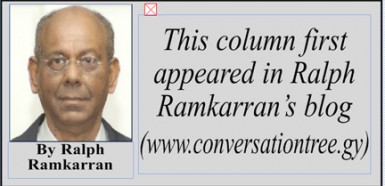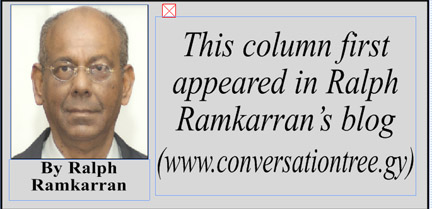Guyana is in virgin, unexplored, political territory. In various interviews both Opposition Leader David Granger and AFC Leader Khemraj Ramjattan, have indicated that the period of foreplay between their parties is over and consummation is in progress. The public awaits the end of the process to determine whether it has ended with an ecstatic bang or an unfulfilling whimper.
Upon past experience, a collaborative effort in Guyana’s politics requires certain sequential steps. The first and most important is to define the objective. The second is to agree on the programme. The third is to establish the leadership structure, one part of which will be the presidential candidate. The fourth is to decide how the seats will be apportioned, particularly if the alliance gets, together, more seats than the individual parties obtained in 2011. The selection of ministers should await the election results.
The circumstances for opposition alliances from the late 1960s to the beginning of the 1990s when the PPP was in opposition, are far different from the present. Ideology was a factor. Potential electoral competition between parties was another. Over-estimation of political support by one or the other party, in the absence of a legitimate method of testing electoral strength, was a problem. Today, the opposition parties are operating in a democratic environment and are aware of their legitimate strengths, and indeed, weaknesses. Ideology is not an issue. They are facing elections in which the governing party is jaded, its message stale, its dynamism sapped, its prospects diminished.

Agreement on a programme is important even if the opposition fails to achieve an electoral alliance. If there is no alliance and the election results are similar to 2011, the PPP will be forced into a coalition if it wants to survive for more than a year in office. The opposition would have a programme to insist on implementation as a condition of together joining a coalition, which ought to be its joint policy.
The opposition, however, needs to consider carefully before going beyond a programme. I referred to this issue last week and it is worth mentioning again. Elections in which the main participants are two large groups, the PPP and APNU-AFC, is a zero sum contest. One will win and the other will lose. If there is no electoral alliance, the opposition goes separately to the elections and the PPP obtains only a plurality, a coalition government is likely. Whichever path is chosen is a calculated risk, but a pre-election alliance appears to hold the greater risk.
If the opposition parties opt for the pre-election alliance and a programme is successfully negotiated, attention could then turn to its governing structure and the presidential candidate. Ethnic honour has been suggested as being important, but ethnic reality cannot be omitted as a consideration. This reality dictates that for an opposition alliance to win the elections, it has to be led by a candidate who is capable of winning votes from the PPP. Unless this reality is taken on board, an opposition alliance would serve no useful purpose because it would lose the elections. Maybe the proponents of ethnic honour can suggest a way to combine the application of that concept with winning the elections for a government that would likely be of limited duration with a limited mandate. The other reality is that a post-election coalition government, as suggested by Dr David Hinds, would leave in place an Indian president. So what’s the point of proposing a post-election alliance, when the same ethnic configuration emerges?
The period of one party majority rule is coming to an end in Guyana. The future may well belong to two large, historically ethnic parties, neither of which gains an absolute majority, and a smaller party to accommodate those not inclined towards the two large parties, even though the AFC is not yet entrenched and such a prediction is subject to the sometimes wild vagaries in political fortunes.
But in such a scenario, and with the nature of constitutional reform being envisaged, whereby the president is chosen in separate, national elections with a minimum of fifty per cent plus one vote, or by the National Assembly after the elections, the large ethnic parties are likely to have to negotiate coalitions. Therefore, for the first time in our post-independence history, it may well turn out that after constitutional reform, the major imponderable will be the race of the head of state which would be known only after intense negotiations and presidential elections by the electorate or the National Assembly.





